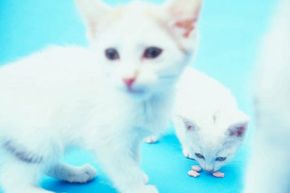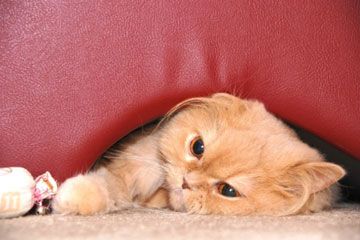Owning a cat with hearing or vision impairment can be challenging but rewarding. Sometimes, treating or managing the condition depends on its cause and when it occurred. Hearing or vision impairment can be caused by a wide range of things, including accidents, disease, reactions to medication or a birth defect. Some cats are predisposed to being deaf at birth. An all-white cat has an increased risk of being deaf, for example. If he has blue eyes, the risk is greater. White cats with yellow eyes or one blue and one yellow eye (odd-eyed) also have a greater than normal risk of being deaf. Not all white cats are deaf, but most cats born deaf are white.
Some vision and hearing loss is treatable. For example, your cat can lose vision if he doesn't get enough taurine. Taurine is an essential amino acid, and it's necessary to maintain the health of your cat's eyes. Without it, his retina will deteriorate, resulting in total blindness in two years. Switching to a food with adequate taurine will stop the deterioration, but there's no way to reverse it. Veterinarians can diagnose taurine deficiencies through a blood test. Commercial cat food contains plenty of taurine, so sticking to that is your best bet. Other eye conditions, such as cataracts (cloudy lenses) can be corrected surgically. If your cat has hearing loss due to a condition such as impacted wax or a non-cancerous tumor, relieving the condition can restore his hearing.
Advertisement
As soon as you notice your cat becoming less responsive to sound, bumping into things or having eye problems, contact your vet for an evaluation so you can figure out the cause and the best course of treatment. If it's not treatable or your cat was deaf or blind from birth, there are lots of things you can do to help him adapt to your home. Read on to find out more.



